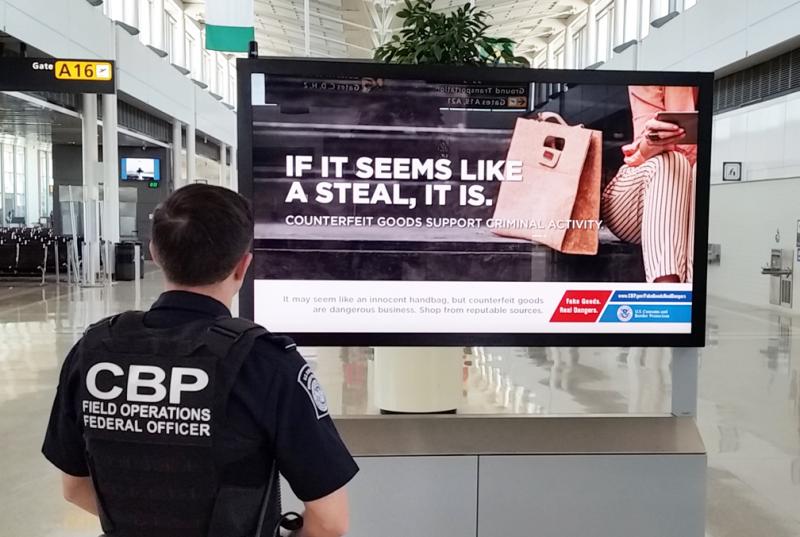Counterfeit Awareness Campaign Posters to Display at BWI during July
STERLING, Va. — Travelers walking through six international airports this summer, including through Washington Dulles International Airport (IAD), will see “The Truth Behind Counterfeits” posters. These posters are part of the U.S. Customs and Border Protection (CBP) Intellectual Property Rights (IPR) initiative to raise awareness of the dangers and negative impacts of purchasing counterfeit goods, including the loss of American jobs and the support of criminal activity.

campaign at Washington Dulles International Airport.
In addition to IAD, this campaign will run through July at some of the busiest U.S. international airports, including Baltimore Washington International Thurgood Marshall Airport (terminals A & B during July only); Chicago O’Hare International Airport; Dallas/Fort Worth International Airport; Los Angeles International Airport; and New York John F. Kennedy International Airport.
Digital ads will also be displayed on travel websites to augment the physical ads in these airports.
“CBP is committed to protecting consumers and enforcing U.S. trade laws, and this campaign will help raise awareness and educate the traveling public about the dangers of purchasing counterfeit goods,” said Brenda Smith, Executive Assistant Commissioner for the Office of Trade. “Not only do counterfeits damage the American economy, such goods can threaten the health and safety of consumers.”
CBP protects businesses and consumers every day through an aggressive Intellectual Property Rights (IPR) enforcement program, and has made IPR enforcement a CBP Priority Trade Issue. Last year CBP seized more than $1.3 billion in counterfeit goods.
Counterfeit products pose criminal, financial, and consumer safety risks for the United States and its citizens. For example, the purchase of counterfeit goods often supports the funding of criminal enterprises and activity, such as money laundering, smuggling, and trafficking in illegal guns and drugs.
Counterfeits also have a large impact on the prosperity of the U.S. economy. When consumers purchase these counterfeit items, legitimate companies lose revenue, translating to lost U.S. jobs and profits over time.
Additionally, counterfeit goods may create health and safety concerns for consumers, as they are often made of inferior materials, manufactured under uncontrolled and unsanitary conditions, and labeled with false information.
“America’s economy runs on authentic innovation. Criminals trafficking in illicit trade threaten America’s prosperity and may jeopardize the health and safety of unwitting consumers,” said David Hirschmann, President and CEO, Global Intellectual Property Center, U.S. Chamber of Commerce. “We applaud U.S. Customs and Border Protection for recognizing the global scope of counterfeiting and the need to educate consumers on how to protect themselves. We hope this initiative will make travelers more aware of the significant problem and real dangers of counterfeit goods.”
The number of IPR seizures increased 9 percent in FY2016 to more than 31,560. The total estimated manufacturer’s suggested retail price (MSRP) of the seized goods, had they been genuine, increased to more than $1.38 billion.
As a result of CBP enforcement efforts, ICE Homeland Security Investigations agents arrested 451 individuals, obtained 304 indictments, and received 272 convictions related to intellectual property crimes in FY2016.
“Customs and Border Protection will continue to work closely with our trade and consumer safety partners to identify and seize counterfeit and inferior merchandise, especially those products that pose potential harm to American consumers,” said Casey Owen Durst, CBP’s Field Operations Director in Baltimore, the agency’s operational commander in the Mid-Atlantic region. “Intellectual property rights enforcement is a mission that we take seriously.”
If you have any information regarding suspected fraud or illegal trade activity, please contact CBP through the e-Allegations website or by calling 1-800-BE-ALERT.
For additional information on CBP’s IPR enforcement efforts and about this public awareness campaign, visit www.cbp.gov/fakegoodsrealdangers.
Downloadable images for the IPR Campaign - Fake Goods, Real Dangers
CBP’s Office of Field Operations
Almost a million times each day, CBP officers welcome international travelers into the U.S. In screening both foreign visitors and returning U.S. citizens, CBP uses a variety of techniques to intercept narcotics, unreported currency, weapons, prohibited agriculture, and other illicit products, and to assure that global tourism remains safe and strong. Learn more about what CBP did during "A Typical Day" in 2016.
CBP's border security mission is led at ports of entry by CBP officers from the Office of Field Operations. Please visit CBP Ports of Entry to learn more about how CBP’s Office of Field Operations secures our nation’s borders.
Learn more about CBP at CBP.gov.


